This is a guest post by Dr. Daniel Bush. Daniel is the author of Live in Liberty: The Spiritual Message of Galatians and Embracing God as Father: Christian Identity in the Family of God. His newest book is Undefended: Discovering God when Your Guard Is Down.

Most of us dislike anything that puts us at risk. Mountain climbing is characterized by risk, yet for many climbers, risk isn’t as important a variable as the level of challenge and the enjoyment they experience. Moreover, the risk tends to diminish with skill and familiarity.
Despite being in great shape, my friend contracted a pulmonary embolism (blood clot in the lung). After five days on antibiotics, the doctors ruled out cancer and declared his heart trouble-free. They never did figure out what the exact cause of his clot had been, but years of climbing may have been the culprit. A high-altitude pulmonary edema (HAPE) is a recognized risk when rapidly ascending to high altitudes as well as the leading cause of death at such elevations.
My friend’s symptoms didn’t deter him from climbing. Blood thinners and a first-aid kit stocked with superglue and a tourniquet was all he needed to hit the hills again. To him, overcoming the challenge to reach the summit and enjoying the breathtaking view was well worth being vulnerable to risk.
Vulnerability, according to Merriam-Webster’s dictionary, is the capacity to be physically or emotionally wounded (the Latin root, vulnerare, means “to wound”). Thus, at the most basic level, to be vulnerable is to be open to danger, and that’s something very different from weakness, which is the inability to withstand wounding. Vulnerability is the willingness to risk being in a situation in which we have no control over the outcome.
Vulnerability isn’t weakness; it’s our greatest measure of courage.
When we have no control over the opinions, mistakes, feelings, attitudes, words, or actions of others, the risk of being wounded is enormous. But without risk we can’t have commitment, and without commitment we can’t have relationship. To put it differently, vulnerability is critical for connection.
Relationships inherently involve connection. They depend on vulnerability. They’re about risk-taking, about courageously lowering our defenses so that we can be truly, honestly, and authentically discovered by another. Of course, such connection isn’t guaranteed—only death and taxes are guaranteed. It’s possible that you may risk and still go home broke. But you might win big. One thing is for certain: your pockets will always remain empty without risk.
So what enables us to drop our defenses and take such a risk? “You have to trust someone stronger than yourself. Demanding reassurances amounts to fleeing from faith. But in trusting ourselves to Christ, we receive not only intimate communion but also freedom” (Undefended, 77).
When we lean wholly into the love of God for us (John 3:16), a love not based upon our ability to climb toward him but only on the faithfulness of his Son, the fear that holds us back from vulnerability with others—the fear of not being loved—dissipates. And it dissipates to the same degree to which we truly rest in what the gospel says about us.
Luke 14 tells of Jesus’ parable of the great banquet, comparing the kingdom of God to a feast. The parable tells us that all of those on the original guest list declined with regrets for one reason or another. Nevertheless, the host is still going to throw a party, so those who wouldn’t normally be permitted to attend were invited, and they came in droves.
One interpretation of this parable looks deeper than the surface invitation to the less fortunate and finds aspects of our own lives in the dysfunctional folks. Jesus’ invitation to the party isn’t extended merely to our spiritual selves, but to the untouchable, unpardonable, and unacceptable parts of us, too. His grace reaches all.
Grace isn’t about revitalizing the living, but raising the dead. “Our fearful, angry and wounded parts of self can never be healed unless they are exposed to divine love. This is why we must meet God’s love in vulnerability and brokenness, not simply in our strength and togetherness,” wrote David Benner.
Meeting the God of the gospel in the dysfunctional and disfigured places in your life is truly freeing. His love and grace is all the defense and reassurance you’ll ever need. And clinging to it alone enables you to risk the vulnerability needed to connect with others, too.
* * *
Rediscover your true identity in Christ—Pick up a copy of Undefended today!





